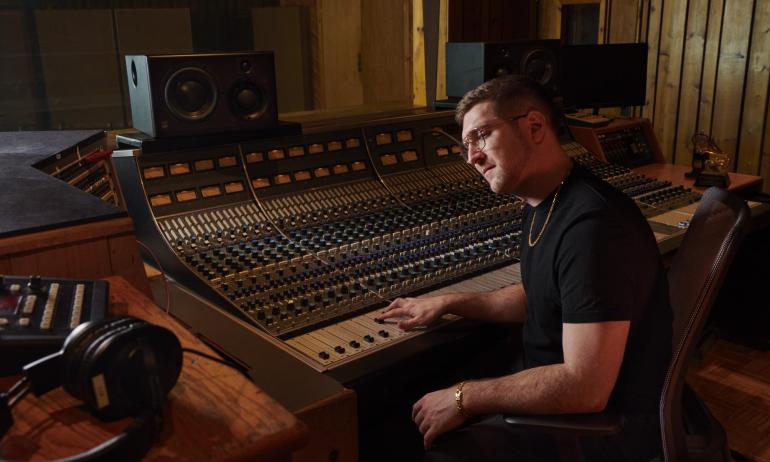15 of the Best Cover Songs (and Why They Work)

Every great cover song answers two questions: why this song, and why this performance?
When they're successful, a good cover manages to comment on the original song—its brilliance, its mood, even its shortcomings—while also highlighting the new performer's own voice and creative interpretation. As a result, the best cover songs are great music and great music criticism all rolled into one.
Consider one of the undisputed best: "Hallelujah" by Jeff Buckley.
Why this song? It's Leonard Cohen's masterpiece, refined over years, but dated by his ’80s synth-driven style. Yet every word, every chord change is a testament to the song's greatness. And why this aching, elemental lightning strike of a performance by one of the nineties' most luminous voices and most tragic figures? Because, well, see the previous sentence.
This is only one example, but the paths to creating a great cover song are as wide-ranging as any artist's influences and imagination. In this playlist, we look at a small sampling of successful cover songs from the past six decades, and explore the many ways that artists have made something fresh and memorable from songs we might still remember.
1. "Fast Car," Luke Combs (Originally by Tracy Chapman)
Some moments in a classic recording are sacred—like when the snare drum first enters Tracy Chapman's "Fast Car" at the lyric, "I remember when we were driving." Country singer Luke Combs's faithful cover preserves the essence but introduces subtle tweaks—vocal twang, production polish—turning a queer Black woman's 1988 folk-rock anthem into a country radio staple and one of 2023's songs of the summer. "I never expected to find myself on the country charts," Chapman told Billboard in July, "but I’m honored to be there. I’m happy for Luke and his success and grateful that new fans have found and embraced 'Fast Car.'"
2. "All Along the Watchtower," The Jimi Hendrix Experience (Originally by Bob Dylan)
Bob Dylan's original version of "All Along the Watchtower," simply arranged with a trotting acoustic trio behind him, presents a striking cast of characters: the jaded joker, the pragmatic thief, the princes who watch the vagrants approach from high above it all. Every scene in Dylan's rendition is like a silent, close-up shot in black and white. Jimi Hendrix's cover, recorded just a year later, is a panoramic, technicolor masterpiece to rival the original. Hendrix builds upon the cryptic spookiness at the song's core with lush studio overdubs, miles of reverb, and that unmistakable guitar, howling like the wind.
3. "My Favorite Things," John Coltrane with Eric Dolphy (Originally by Rodgers and Hammerstein for The Sound of Music)
Like Hendrix with "All Along the Watchtower," John Coltrane began playing this now-famous show tune just a year after The Sound of Music debuted on Broadway. This freewheeling interpretation became a prime example of the artist's ability to turn melodies and chords inside-out and upside-down, transforming the familiar into the utterly new. On this 1961 recording, Coltrane is joined by Eric Dolphy, whose flute adds another level of strangeness to the familiar tune, making the immediately recognizable melody that much sweeter when it finally emerges.
4. "Born Under Punches," Angélique Kidjo (Originally by Talking Heads)
"On their classic 1980 album, Remain in Light, Talking Heads channeled the trance-like rhythms of Afrobeat and Fela Kuti, an influence that's unmistakable from the opening seconds of "Born Under Punches," says Nick Balkin, director of editorial services at Berklee. "Beninese singer Angélique Kidjo’s 2018 version [produced by Jeff Bhasker ’99] breathes new life into the track, honoring the original while infusing it with the spirit of her African roots."
5. "I Will Always Love You," Whitney Houston (Originally by Dolly Parton)
Is the cover greater than the original? Is the original greater than the cover? In this instance, both exist in a rare, perfect harmony. With her spellbinding vocal performance, Houston earns the right to call this a signature song—even as it has remained one of Parton's most cherished tracks throughout her career. The two versions somehow amplify one another rather than replacing each other. As one YouTube commenter puts it: "Listen to Dolly's original version when your heart is breaking, listen to Whitney's version when you're ready to move on."
6. "Ring of Fire," Johnny Cash (Originally by Anita Carter)
It was in 1963 that Johnny Cash first reworked Anita Carter's folk ballad "(Love's) Ring of Fire" (cowritten by future wife June Carter), picking up the pace and giving it a proper backing band with its trademark horns and shuffling drums and cooing back-up singers. With his classic baritone speak-singing, it almost sounds like Cash is less interested in defining "love" than describing the fire. This version became authoritative, overshadowing Carter's earnest, sentimental original in cultural memory.
7. "Ring of Fire," Social Distortion (Originally by Anita Carter, by way of Johnny Cash)
Punk covers have a way of revealing a song's core. In Social Distortion's version of "Ring of Fire," Cash's version loses its mariachi trumpets in the flames of chugging distortion, but what emerges is a streamlined, snarling testament to the song's durability. Through every sonic transformation, in those chords, in those words, the same cynical romance burns, burns, burns.
8. "Hurt," Johnny Cash (Originally by Nine Inch Nails)
Perhaps even more radical than a punk band covering Johnny Cash—when the Man in Black himself took on industrial rock’s jaded champions and did them one better.
9. "Everybody Wants to Rule the World," Lorde (Originally by Tears for Fears)
"In Lorde's atmospheric cover, she exposes the twisty underworld and sinister core of the original song that’s been hiding in plain sight," says Maureen McMullan, concert and event producer at Berklee. "Harmonically, much of the song now dwells in minor, where we previously had bright major vamps with ‘80s-style bass pedals. The melody is altered accordingly, though still highly recognizable. Sonically, we’ve gone from new wave sensibilities to dystopian drones and eerie otherworldly symphonic soundscapes."
10. "Heartbeats," José González (Originally by the Knife)
"While a dance remix is not always a cover song, the tradition of remaking a popular song into something club-ready goes back decades," says Bryan Parys, a writer in Berklee's editorial office. "This is why I assumed that 'Heartbeats' by Swedish electronic duo the Knife was a danceable cover of the version by José González, when in fact, it was the other way around. The simplicity of Gonzalez's cover somehow reveals the song's complexity, showing us that just because you can dance to it doesn't mean it's party music."
11. "Stairway to Heaven," Rodrigo y Gabriela (Originally by Led Zepplin)
With covers of bands including Metallica and Led Zepplin, Mexican guitar duo Rodrigo y Gabriela made the rhythmic and emotive connections between flamenco-style guitar and hard rock seem downright obvious. But before the duo's eponymous 2006 breakout album, it was difficult to imagine two sets of nylon strings could make you want to headbang like it's 1971 and Jimmy Page just clicked on the overdrive.
12. "Lemonworld," Bartees Strange (Originally by the National)
Bartees Strange's debut statement was an EP of National covers, Say Goodbye to Pretty Boy. As a Black musician working in an indie scene dominated by white voices and white fans, he approached these reimagined versions as meditations on the band's influence, but also on why it was that he saw so few Black folks at National shows. Bartees covered the original version of "Lemonworld" out of admiration, but he also seems to have had an inkling that, given his own place on the stage, he could make something just as thrilling.
13. "Weird Fishes," Lianne La Havas (Originally by Radiohead)
"All cover songs are in dialogue with their source material, and the best ones move the conversation into surprising places," Parys says. "For Lianne La Havas's version of 'Weird Fishes,' originally by Radiohead, that surprise happens immediately. The drums begin in lockstep with Radiohead's beat, but quickly move into half-time to find a looser groove for La Havas to roam through. Both versions end with the refrain 'hit the bottom and escape,' and where Radiohead's version teeters on the edge of chaos, La Havas's vocals soar, not just suggesting an escape, but giving us one."
14. "Unnai Kaanadhu Naan," Berklee Indian Ensemble (Originally by Shankar–Ehsaan–Loy for the Bollywood Film Vishwaroopam)
Sometimes the pleasure of a cover—especially a live cover—is seeing a polished, fully orchestrated work get reassembled right there in the moment, before your eyes. In their attentive yet freewheeling cover of this Bollywood tune from the powerhouse trio Shankar–Ehsaan–Loy, the Berklee Indian Ensemble demonstrate how the original was put together before teasing the layers back apart to make space for a new bit of dialogue between violin and bouzouki that's all their own.
15. "Tomorrow Never Knows," Goose (ft. Trey Anastasio and Father John Misty) (Originally by the Beatles)
Alumni act Goose, heirs to the American jam band throne, often use live covers to showcase their diverse influences. Earlier in this Radio City Music Hall release show for their album Dripfield, they brought folk-rock prankster Father John Misty onstage to cover his song, "I'm Writing a Novel," then invited Phish frontman Trey Anastasio to join them for a few originals before tying it all together for the closer: a cover of the Beatles song that launched a thousand pensive psychedelic jams, featuring Anastasio on colead guitar and Misty on drums. With all these influences on display, it doesn't take long to realize that reverse guitar part from Dripfield's title track actually rewinds all the way to this one from 1967.
Listen to Goose on Sounds of Berklee:





